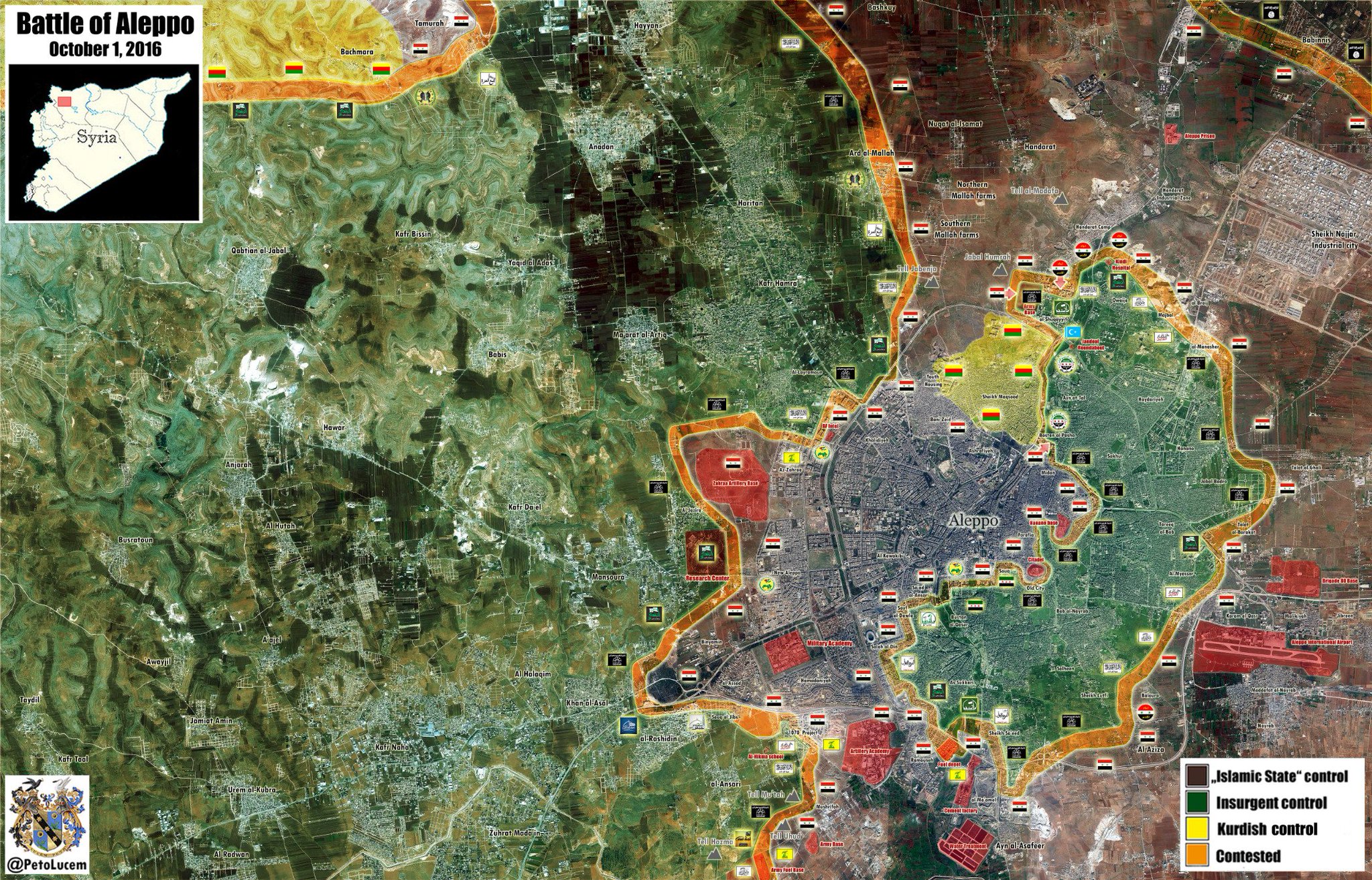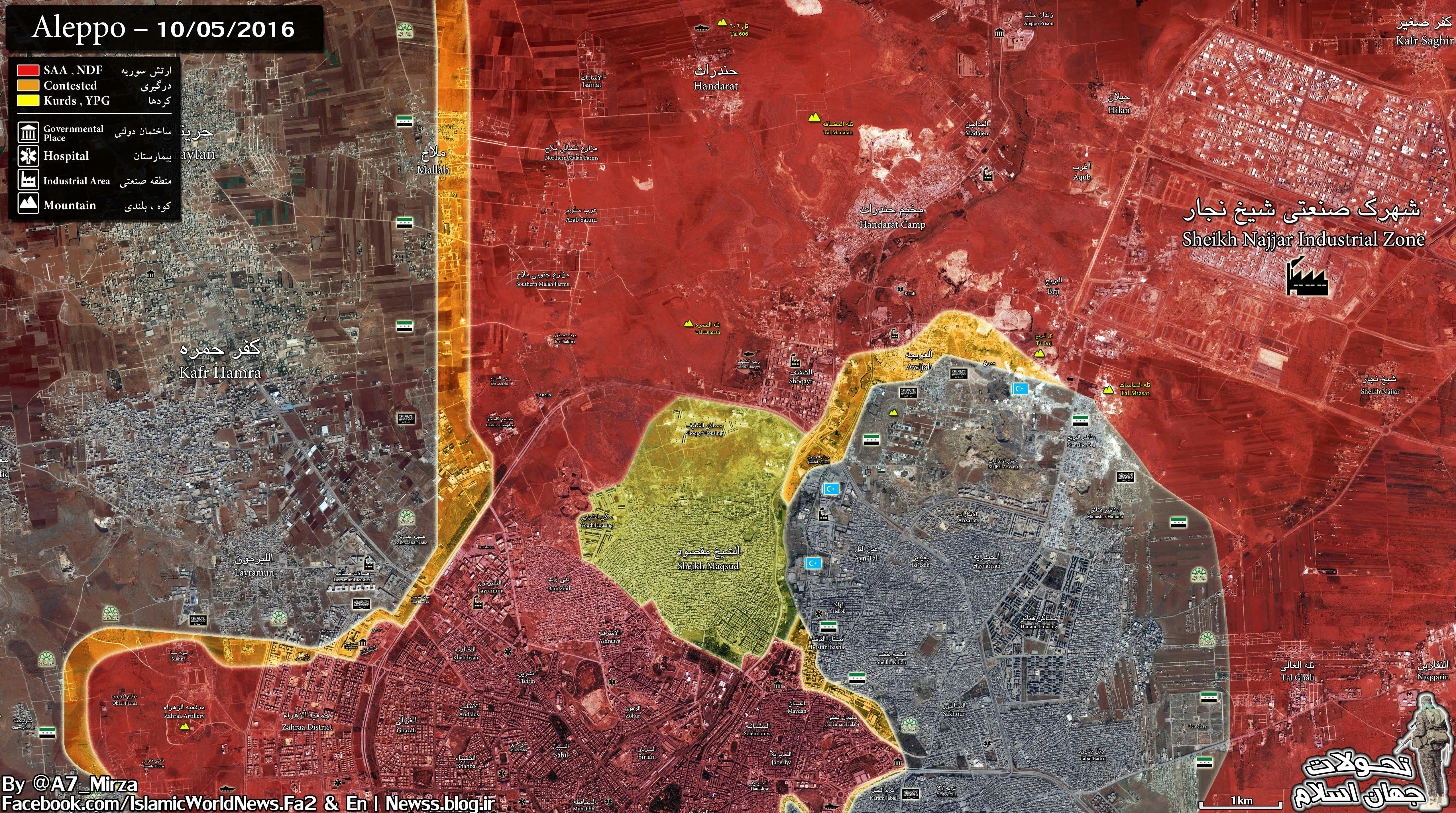Jura The idiot
General
according to the Wall Street Journal
Iraqi Militias Complicate Aleppo Battle
Fighters combating Islamic State at home pour into Syria to support regime’s siege
Iraqi Militias Complicate Aleppo Battle
Fighters combating Islamic State at home pour into Syria to support regime’s siege
source:Iraqi militia fighters are pouring into Syria to reinforce the Assad regime’s siege of rebels in Aleppo, further complicating the tangled web of alliances the U.S. relies on to fight Islamic State, which can turn an ally on one side of the border into an enemy on the other.
The Shiite militias, who have fought alongside U.S.-backed Iraqi government forces against Islamic State in Iraq, are now fighting Syrian Sunni rebels, some of them armed and trained by the U.S.
More than 1,000 Iraqi Shiite militants have traveled from Iraq since early September, joining the ranks of as many as 4,000 others already on the ground near Aleppo, the militia leaders and Syrian rebels said. They make up about half of the regime’s estimated ground force of 10,000.
The siege they are helping to enforce has tilted the battle there in favor of President Bashar al-Assad, whose ruling Alawite sect has drawn on fellow Shiite powers to shore up government forces depleted by deaths, defections and attrition over five years of war: Iran’s Revolutionary Guards Corps, Lebanon’s Hezbollah militia and Afghan Shiite fighters.
The regime, along with its ally Russia, has been heavily bombarding rebel areas of the divided city over the past few weeks. The offensive has killed hundreds, including scores of children, and caused the collapse this week of joint U.S.-Russian efforts to forge a lasting cease-fire and restart talks on a political solution.
In an update on the Aleppo situation published on Tuesday, the United Nations Office for Coordination of Humanitarian Affairs said living conditions for the roughly quarter of a million people in besieged neighborhoods of eastern Aleppo have deteriorated, and “an assessment conducted in eastern Aleppo city concluded that 50% of the inhabitants expressed willingness to leave if they can.”
Hashem al-Mosawwi, a commander of the Iraqi Shiite militia Al Nujaba, or “The Noble Ones,” said his group deployed 1,000 fighters to Aleppo in September—the latest influx of Shiite fighters in recent weeks—and that he sees their involvement as part of a larger regional struggle against terrorism. Other militia leaders said they also sent fighters recently, without giving numbers.
Mr. Mosawwi claimed the rebels in Aleppo are part of an extremist Sunni axis sponsored by Saudi Arabia and the U.S.
“Those…terrorist groups cause all problems in the region and the world and they should be stopped,” he said, naming several Sunni opposition groups in Syria he deems synonymous with the Sunni extremists of Islamic State. The Syrian opposition is dominated by the country’s Sunni majority.
A spokesman for the U.S.-led coalition in Iraq and Syria didn’t respond to a request for comment.
What is remarkable is that the Iraqi militias are flooding in to fight a battle deep inside Syria just as the anti-Islamic State alliance back home is gearing up for its biggest battle in more than two years of war. The offensive against Mosul, the extremist group’s last stronghold in Iraq, is expected to start this month.
The Shiite militias are expected to play only a marginal role in the battle for Mosul, despite having successfully led some battles to evict Islamic State from Iraqi cities and towns, including Sunni-majority areas such as Tikrit.
Allegations that the militias have systematically abused the Sunnis, whom they perceive as Islamic State sympathizers and who make up the bulk of the population in the areas the extremist group seized in 2014, have recently prompted the government to restrict the Shiite militias to second-tier roles. Militia leaders said the steady sidelining of their paramilitaries inside Iraq has been one of the key factors behind their push into Aleppo.
Many of the militia fighters had first mobilized to Syria in 2012, fighting on the side of Mr. Assad. But in 2014 that saw the militants take nearly a third of the country.
Their return has given Mr. Assad an auxiliary force experienced in urban combat and steeped in the belief that the anti-Assad forces are ideologically indistinguishable from Islamic State radicals and are proxies of Iran’s regional arch rival, Saudi Arabia.
Al Nujaba is part of a triad of Iraqi Shiite militias currently besieging eastern Aleppo. The other two are Asaib Ahl al-Haq and Abu al-Fadl al-Abbas, commanders said. Asaib fought American troops during the decadelong U.S.-led war in Iraq. Leaders of all three militias deny allegations of abuses and of stoking sectarian tensions.
Mr. Mosawwi said his forces are in Syria to protect Shiite and Christian holy sites, while offering the Assad regime their expertise honed over two years of battles with Islamic State in Iraq.
The outcome of the yearslong fight to retake Aleppo is considered crucial to determining the victors of Syria’s larger war. Some diplomats in the Middle East said they worry that Iraq’s Shiite militias are morphing into a larger, externally focused force set on settling Shiite-Sunni scores across the region.
“The use of the Iraqi [militias] reflects how the Iranian outreach in the region is becoming more and more aggressive and Iran is using solely Shiite forces to increase the level of warfare across the region to achieve their political means,” a senior Arab diplomat based in Beirut said. “But it’s only serving to increase sectarian tensions in the region and the cycle of bloodshed perpetrated in this competition between Saudi Arabia and Iran.”
The Badr Organization, one of Iraq’s strongest Shiite paramilitary forces and a political party, doesn't currently have forces in Aleppo, but it has hinted that after the battle for Mosul it may expand its local base into a regional force.
Moeen al-Kadhemi, a deputy leader of Badr and a commander of the armed wing, sees potential for his group to join the fight in Syria once Islamic State is defeated in Iraq.
“In the future, after finishing Iraq, we may have to go abroad to fight the enemy,” he said.




